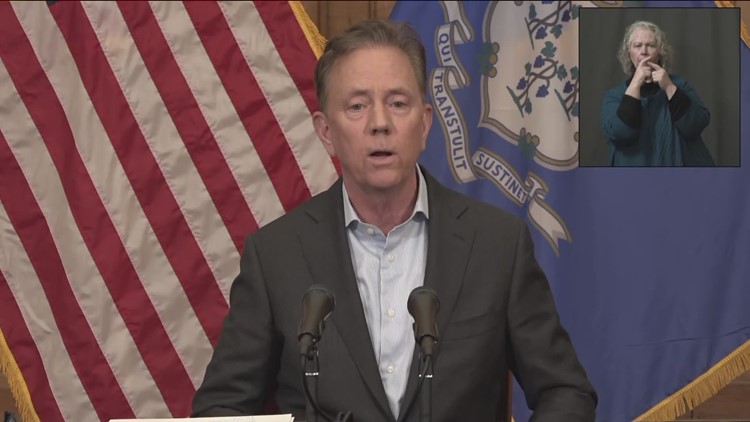With the 2020 fiscal year set to end on June 30th, 2020, Governor Ned Lamont revealed where the state stands as of May 1, 2020, and called the numbers "sobering," with officials anticipating a $934 million deficit.
"COVID has been tough on our physical health, it's been tough on our mental health, and it's also been tough on our fiscal health," Governor Lamont said. "The state was on track, doing very well - on budget - up until a couple of months ago."
Governor Lamont said the numbers presented during Friday's briefing are assuming the state does not get additional federal aid.
"As we've learned, how can Connecticut do it on its own and what would that look like - plan for the worst and hope for the best," Governor Lamont said. "We're looking at about a $900 million deficit this fiscal year, which ends June 30th. It's a deficit that really didn't exist until recently with COVID. That $900 million overstates it a little bit. There's about $370 million that we thought was coming from the feds this fiscal year - it's in the next fiscal year."
Governor Lamont said the state's rainy day fund is still intact.
"That's going to allow us to power through the end of this fiscal year. It gave us a lot of flexibility in terms of putting off some of the tax revenues to give you more breathing room as well," Governor Lamont said.
Governor Lamont said he and Office of Policy Management Secretary Melissa McCaw are now doing everything they can to "stretch out the rainy day fund," not just for this fiscal year, but for fiscal year 2021.
According to McCaw, some of the shortfall is due to lower personal income tax withholding.
"Obviously, we have a significant number of unemployed individuals in the state, and we immediately begin to see a reduction of income tax withholding. For the month of March alone, we saw a 3.7% reduction in withholding, and obviously we were at the very early stages of our COVID economic impact in the state," McCaw said.
As the state moves into fiscal year 2021, starting on July 1, 2020, McCaw says there is a budget that has been adopted and is in place that has not been amended.
"That budget is a $20.2 billion budget based on the updated consensus revenues. We project revenues of $18 billion, leaving us with a revenue shortfall of about $2.164 billion," McCaw explained.
According to the state, the biggest areas of change include personal income tax withholding, sales and use tax, corporation tax, and the timing of receipt of federal grants from FY2020 to FY2021.
"So what does that mean for us for fiscal year 2021? As indicated, we have about a $2.164 billion revenue shortfall…and we have some other areas that we knew required adjustments in the midterm budget. For example, for our health care costs - about $40 million an adjustment that we would've made in the midterm budget, pension costs - just to reflect the latest numbers from our actuaries, as well as some of our entitlement programs such as Medicaid," McCaw said. "There's a known amount of adjustments that would've been required to this budget. That is about $164 million. When you take the revenue shortfall and some of those expenses that will come in higher - we project a $2.3 billion deficit, early estimate, for fiscal year 2021."
According to McCaw, the state will depend on the rainy day fund to cover the FY2020 shortfall.
"We estimate closing the fiscal year with an approximate $1.9 billion rainy day fund," McCaw said. "We are very fortunate here in Connecticut for the foresight of prior leaders, as well as diligence of our current governor, in protecting the rainy day fund. We have one of the highest rainy day funds in the nation at 13% of general fund revenues."
McCaw said with the $2.3 billion dollar deficit estimated for FY2021, the state will require additional mitigation to close the fiscal year in balance, and framework for that mitigation is being created in partnership with the Appropriations and Finance and Revenue Chairs.
"The soft edges of that plan, if you will, would include some amount of revenue changes, which would be essentially holding revenues flat where there might have been opportunity to give additional tax relief," said McCaw. "We'll likely be proposing to hold the line on those types of changes. We estimate about $100 million in revenue changes. We also estimate about $415 million in rescission and other deficit mitigation factors. The governor does have 5% rescission authority in statue and any other reductions above and beyond that would require legislature action."
McCaw said with those measures, the state will be attempting to reduce the shortfall to $1.8 billion to allow officials to utilize the remaining budget reserve fund balance. McCaw added the numbers are estimates, and the state won't know how it closed FY2020 until the fall.
State officials say the state's transportation fund will also see challenges.
"We had hoped given gasoline tax fuel revenues that the special transportation fund would at least stay solvent for another 3 or 4 years. Right now, it looks like, given the drastic cut in gasoline prices, the drastic cut in revenues coming into the special transportation fund with our share of the gas tax - that special transportation fund will probably eat up the reserve funds by July 1 of next year," Governor Lamont said. He added he would like to work with the legislature to figure out funding.
According to McCaw, economists estimate recovery will start as early as 2022.
"This will be a swift downturn and we will begin to grow. However, we will need to look at additional mitigation to support our budgetary needs as Connecticut reopens and recovers," said McCaw. "As we've seen in prior downturns, it does take multiple years for our revenues to return to prior levels."



